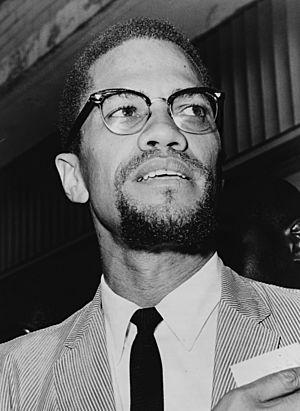Pan-Africanism facts for kids

Pan-Africanism is a big idea and a movement that wants all people of African descent to be united and work together. This means people from Africa, America, Europe, or anywhere else. It's about helping each other to make progress and gain freedom.
Contents
- Where Did Pan-Africanism Start?
- Who Are the Key Leaders of Pan-Africanism?
- Important Moments in Pan-African History
- What Are the Goals of Pan-Africanism?
- Pan-Africanism Today
- How Does Pan-Africanism Affect the World?
- Examples of Pan-Africanism in Action
- Why Is Pan-Africanism Important?
- Images for kids
- See also
Where Did Pan-Africanism Start?
To understand Pan-Africanism, let's go back in time. Many years ago, people were taken from Africa and forced into slavery in other parts of the world. This was a very unfair time.
Even after slavery was stopped, people of African descent still faced discrimination and unfair treatment. They were not treated equally. They also did not have the same chances as others.
Because of this, the idea of Pan-Africanism began to grow. People realized they needed to unite and support each other. They believed that by working together, they could build a better future for all people of African descent.
Who Are the Key Leaders of Pan-Africanism?
Every important movement has its leaders. Pan-Africanism has had many people who helped shape it. Here are a few of them:
- W.E.B. Du Bois (1868-1963): W.E.B. Du Bois was an American writer and civil rights leader. He was a very important voice in the Pan-African movement. He helped set up the first Pan-African Conference in London in 1900. Du Bois believed that African people should have the right to vote, get an education, and be treated with respect.
- Marcus Garvey (1887-1940): Marcus Garvey was a leader from Jamaica. He started the Universal Negro Improvement Association (UNIA). This group promoted pride in Black heritage and self-reliance. Garvey thought that African people should return to Africa. There, they could build strong, independent nations.
- Kwame Nkrumah (1909-1972): Kwame Nkrumah was the first president of Ghana. He strongly believed in African unity. He played a big part in forming the Organization of African Unity (OAU). Nkrumah felt that a united Africa could stand strong against outside control.
Important Moments in Pan-African History
The Pan-African movement has a rich history. It is full of important events. Here are some key moments:
- The First Pan-African Conference (1900): W.E.B. Du Bois organized this meeting in London. It brought together people from Africa, the West Indies, and the United States. This was a key step in building a global Pan-African movement.
- The Universal Negro Improvement Association (UNIA) (1914): Marcus Garvey founded the UNIA. It became the largest Pan-African group in the world. It promoted Black pride, self-reliance, and the idea of returning to Africa.
- The Fifth Pan-African Congress (1945): This meeting was held in Manchester, England. It was a major turning point for the movement. It focused on freeing Africa from colonial rule. It also stressed the importance of economic growth.
- The Organization of African Unity (OAU) (1963): The OAU was created to encourage unity and cooperation among African countries. It is now called the African Union (AU). This was a big success for the Pan-African movement.
What Are the Goals of Pan-Africanism?
So, what does Pan-Africanism want to achieve? Here are some of its main goals:
- Unity: To bring together people of African descent from all over the world.
- Support: To help each other when facing challenges and unfair treatment.
- Progress: To work together to make life better for African people everywhere.
- Freedom: To fight for Africa's freedom from colonial rule and new forms of control.
- Economic Growth: To help Africa and African communities worldwide grow stronger economically.
- Culture: To celebrate and keep African culture and heritage alive.
Pan-Africanism Today
Even now, Pan-Africanism is still an important force. The African Union (AU) works to promote cooperation among African countries. Pan-African ideas also inspire groups fighting for fairness and equality in African communities around the world.
How Does Pan-Africanism Affect the World?
Pan-Africanism has had a big impact globally. It has:
- Inspired Independence: It played a key role in the fight for freedom from colonial rule in Africa.
- Promoted Civil Rights: It has inspired movements for equal rights for people of African descent in other parts of the world.
- Encouraged Cultural Sharing: It has helped African countries and communities share their cultures.
- Supported Development: It has promoted economic growth and cooperation in Africa.
Examples of Pan-Africanism in Action
Here are some ways Pan-Africanism works in the real world:
- The African Union (AU): The AU is a group of African countries. They work together for peace, safety, and economic growth in Africa.
- Cultural Festivals: Pan-African cultural festivals celebrate African culture and history. They bring together people of African descent from all over the world.
- Scholarship Programs: These programs help African students study abroad. They also help students from other countries study in Africa.
- Sister City Programs: These programs connect cities in Africa with cities in other parts of the world. They help promote cultural sharing and understanding.
Why Is Pan-Africanism Important?
Pan-Africanism is important because it reminds us that we are all connected. It encourages us to celebrate our shared history. It also tells us to work together to create a better future for everyone. It teaches us about the importance of unity, support, and progress.
Images for kids
-
Jamaican Marcus Garvey in a military uniform during a parade in Harlem, New York City, 1922
-
A mural in Ujiji, Tanzania
See also
 In Spanish: Panafricanismo para niños
In Spanish: Panafricanismo para niños





